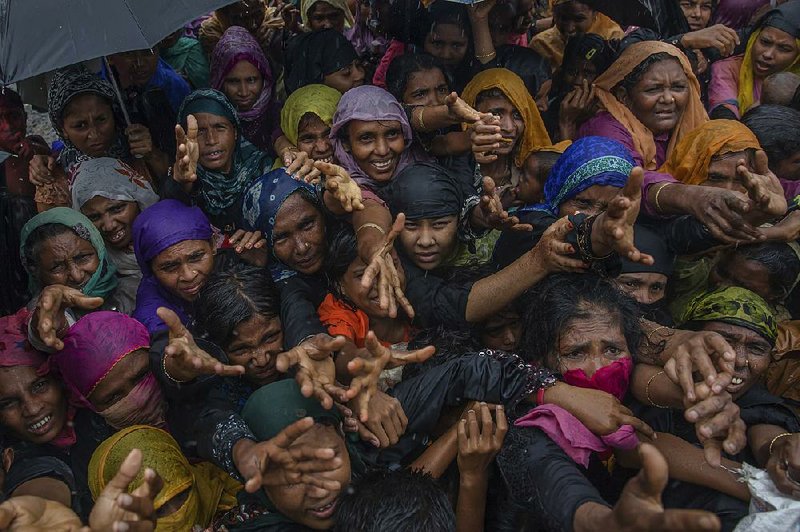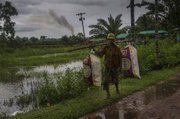COX'S BAZAR, Bangladesh -- Bangladeshi authorities on Sunday took steps to restrict the movement of Muslim Rohingya refugees living in crowded border camps after fleeing violence in Burma, while that nation's military chief maintained the chaos was the work of extremists seeking a stronghold in the country.
Bangladesh has been overwhelmed with more than 400,000 Rohingya who fled their homes in the past three weeks amid a crisis the U.N. describes as ethnic cleansing. Prime Minister Sheikh Hasina, who lambasted Burma for "atrocities" during a visit to border camps last week, left Dhaka to address the annual U.N. gathering in New York.
Refugee camps were already beyond capacity and new arrivals were staying in schools or huddling in makeshift settlements with no toilets along roadsides and in open fields. Police were checking vehicles to prevent the Rohingya from spreading to nearby towns in an attempt to control the situation.
"There is an instruction from the prime minister that we must treat Rohingya Muslims maintaining human rights," said A.K.M. Iqbal Hossain, a police superintendent. "As many private and social organizations are coming and distributing relief, sometimes chaos breaks out."
He said with the scale of the crisis "it's very difficult to keep order, but we are doing so."
United Nations Secretary-General Antonio Guterres said Burma leader Aung San Suu Kyi has one "last chance" to stop the refugee crisis in the west of the country.
"I would expect that the leader of [Burma] would be able to contain it, and would be able to reverse the situation," Guterres said on British broadcaster BBC. "She has a chance, she has a last chance, in my opinion, to do so."
Acknowledging that the Burmese army -- which still has large sway over politics in Burma after decades of military rule -- also had a role to play, he said that "the tragedy will be absolutely horrible," if the situation cannot be reversed.
The Rohingya crisis is set to figure as a key issue at the U.N. General Assembly, where world leaders are gathering for meetings and to make speeches in the coming week.
Suu Kyi is skipping the meeting, and instead will give a televised address in Burma on Tuesday to talk about the crisis.
The refugees began pouring from Burma's Rakhine state after a Rohingya insurgent group launched attacks on security posts Aug. 25, prompting Burma's military to launch "clearance operations" to root out the rebels. Those fleeing have described indiscriminate attacks by security forces and Buddhist mobs.
The Burmese government says hundreds have died, mostly "terrorists," and that 176 out of 471 Rohingya villages have been abandoned. Burma has insisted that Rohingya insurgents and fleeing villagers are destroying their own homes. It has offered no proof to back these charges.
Ethnic Rohingya have faced persecution and discrimination in majority-Buddhist Burma for decades and are denied citizenship, even though many families have lived there for generations. The government says there is no such ethnicity as Rohingya and says they are Bengalis who illegally migrated to Burma from Bangladesh.
"The violence was an organized attempt of extremist Bengalis in Rakhine state to build a stronghold," Burma's powerful military chief Min Aung Hlaing said Saturday, according to a statement posted on his official Facebook page. "They have demanded recognition as Rohingya, which has never been an ethnic group in Myanmar."
Burma is often called Myanmar, a name that ruling military authorities adopted in 1989. Some nations, such as the United States and Britain, have refused to adopt the name change.
With the U.N. saying there are some 240,000 children among the refugees living in dire conditions, Bangladeshi authorities have kicked off an immunization drive. Abdus Salam, the top government administrator in the Cox's Bazar district hospital, said that some 150,000 children would be immunized over seven days for measles, rubella and polio.
"There are a lot of weak and malnourished children among the new arrivals," UNICEF representative in Bangladesh, Edouard Beigbeder, said in an email. "If proper preventive measures are not taken, highly infectious diseases, especially measles, could even cause an outbreak."
Eric Schwartz, head of the U.S.-based charity Refugees International and a former assistant secretary of state for population, refugees and migration, said he couldn't recall seeing so much misery in the camps and called for international pressure on Burma to stop the violence.
"The stories that we are hearing. I visited a hospital yesterday, children ages 1, 5, 10 suffered burn wounds, gunshot wounds and with human beings essentially treated like animals," he said.
He said the U.S. should re-impose sanctions on Burma that were in place before it made transition from military to civilian rule.
Officials in Washington have been careful not to undermine the weak civilian government of Nobel Peace laureate Suu Kyi, who took office last year, ending five decades of army rule. The military remains politically powerful and the nation's constitution enshrines military authority over all security operations.
Information for this article was contributed by Julhas Alam of The Associated Press; and staff members of Tribune News Service.
A Section on 09/18/2017

